Hey Everyone! Happy Labor Day Weekend to you and your families! Just a quick note to let you know that there are two new features now posted on my website.
For the opportunity to do some spiritual reflecting, check out Eyes Remade for Wonder.
And for some more tachlis (practical) information about ways that you and your family might experience Rosh HaShanah and Yom Kippur, click here for my new High Holy Day Resource Page.
QUESTION 1Tonight, in honor of Parshat Shoftim, we'll be studying (among other things) this text, from Rabbi Samson Raphael Hirsch of 19th century Germany:
"Note that even now [in Deut. 16], when the text clearly refers to the time when Israel has already completed its occupation [conquering] of the Land, Scripture still uses the term take possession, with reference to the political security that Israel will gain if it will honor and promote justice. From this we learn a momentous truth: Israel’s possession of the Land can be called into question at any time, and the Jewish state must take possession of the Land ever anew through the full realization of justice."
To what extent does Hirsch's suggestion, that justice is a pre-requisite for a strong and vital Israel, apply to the modern State of Israel today?
I, for one, think it is hugely relevant. In a day and age when Israel wields significant power over the Palestinians...a power that is at times over-used, or some would say abused...can the value of tzedek - of justice or righteousness - guide us in how we relate to the (Arab) 'other'? Equally important: what is the best, and most just, way for us (American Jews) to have this conversation with Israel and her leaders?
QUESTION 2Everyone should take the time to check out The New York Times' great conversation piece about whether or not American support for Israel has hurt our credibility on the international stage. (I find the question ironic since I know there are so many who think that the Obama Administration - and by extension America - could be doing much more to support Israel.)
Discuss away! I'd love to hear your thoughts on either, or both, of these important questions. Shabbat Shalom!
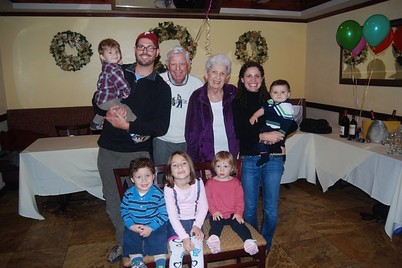
My grandparents, Harriet and Stan Landsberg, with me, my sister, and five of their great-grandchildren, in November of 2011.
Everybody has a past. A part of their history that is separate from the world they inhabit today...but which deeply informs who they are as people. The past shapes our values. And the past is where our most cherished relationships were born.Harriet and Stan Landsberg are my maternal grandparents, presently of South Florida, and formerly of Jersey City, NJ. But they came from THE BRONX. (As to where their parents came from, see my earlier posting.)When I was a kid, the Bronx was a mysterious place that was constantly mentioned in stories and family history. But it was never a place that I saw firsthand. (There was an occasional visit to the Bronx Zoo during my childhood, but no one ever explained to me....or at least I don't remember if they did...that my grandparents used to live a few blocks away!)In my everyday life, the only proof of a family connection to the Bronx was my mom's New Yawk accent.A few weeks ago, shortly after our arrival in Westchester, after going up and down the Major Deegan a few times, and after studying the map, I finally realized that we were practically living right next door to the place where my family had laid its roots.So: a quick phone call was placed to Grandma and Granpda. They, of course, had total recall of all of their old exact addresses...and so, Amy and I made plans to trek out to that mysterious place that I have been hearing about for the last three decades. It blows my mind that from my grandparents' final home in the Bronx to Scarsdale Synagogue, it is a mere 9.8 miles! Isn't it strange to think that such a small distance separates us today from such a different world? (There are ethical and social justice dimensions to that question, but we'll have to leave that for another day.)
So: down the Bronx River Parkway we headed....to 592 Beck Street, near the intersection with Avenue St. John (exactly as my grandmother had described it!). This is where my grandmother lived for the first nine years of her life!
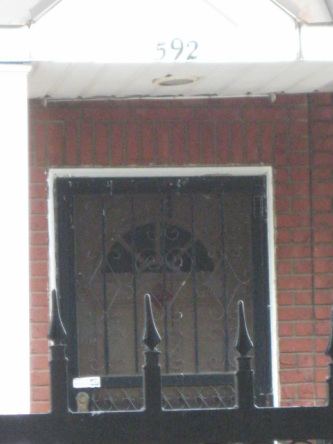
A close up of the front door of 592 Beck.
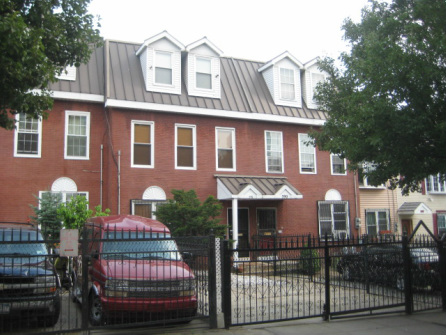
A wider shot of the rowhouses.
Beck was a quiet street on the day that we visited, and felt pleasantly distant from the noise and activity that marked the other Bronx neighborhoods that we visited afterward.
From there, we headed to northeast to 945 East 180th Street, where my grandmother lived from the age of nine until she married my grandfather in the early 1940s. This is the neighborhood that abuts the Bronx Zoo.
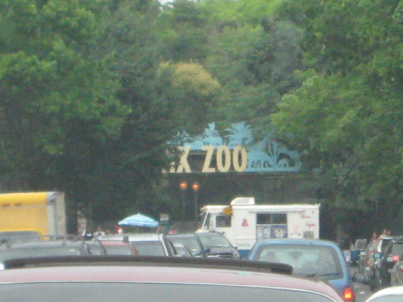
The unexpected view of the zoo from our car on our way to 180th Street.
Unfortunately, we were saddened to discover, upon arriving, that 945 East 180th no longer stands. It appears that developers must have knocked the building down at some point to make way for a modern-looking apartment building to the left of where 945 once stood.
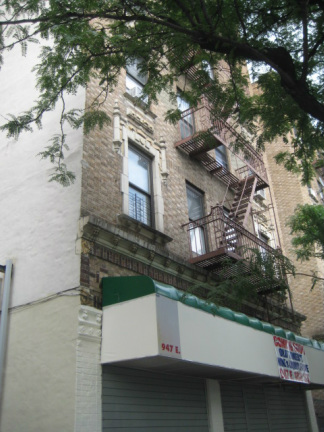
This is building 947.
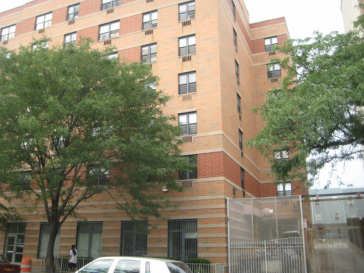
This is the modern construction I mentioned. I am presuming that 945 once stood in the gap to this building's right?
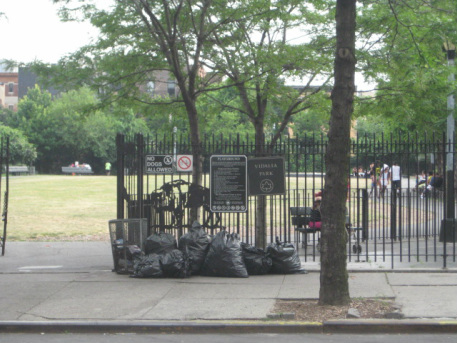
Vidalia Park, which is on the other side of East 180th, directly across from where 945 once stood. According to the NYC Parks Department, the park was dedicated in December of 2001.
From East 180th, we headed around the corner to 2109 Daly Avenue, where my grandfather lived. City life is amazing....you can live a block and a half from someone, and then wind up spending the rest of your life with them!
Unfortunately, it looks like Daly Ave. was a "victim" of development just like East 180th. There's no 2109 anymore - just 2105.
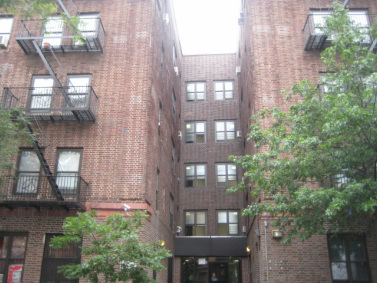
2105 Daly
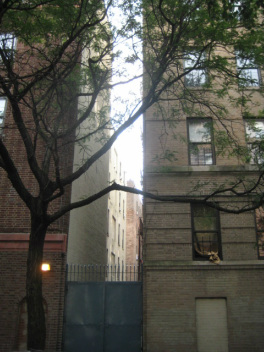
The gap between the buildings: where 2109 once stood?
From there, we headed west to 1631 Grand Avenue. This is where my grandfather's parents were living during and immediately after World War II. After my grandparents got married, they lived with my grandfather's parents at 1631 Grand. This is also the location where my Aunt Barbara was born. (We were happy that this building was still standing!)
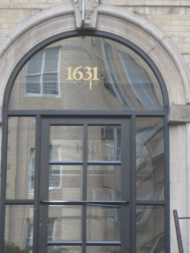
The front door of 1631 Grand.
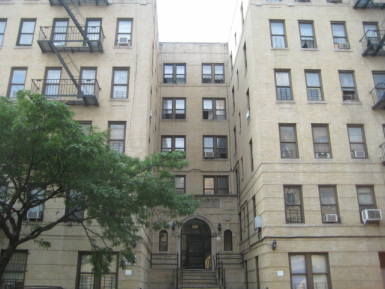
1631 Grand: the view from across the street.
From there it was about four miles to the northeast for the last official stop on our tour...to 3307 Hull Ave. My grandparents moved here when my aunt was two. The highlight of this stop: this is where my mother was born. My grandmother, who pleasantly tolerates my occasional complaining about the stresses of modern parenthood, went to great lengths to remind us that the storage area where they had to keep my mother's stroller was three floors below their apartment (no elevator), and that she had to shlep down there every time they wanted to go out.
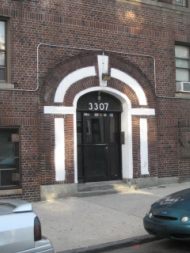
The front door of 3307 Hull with its distinctive arch.
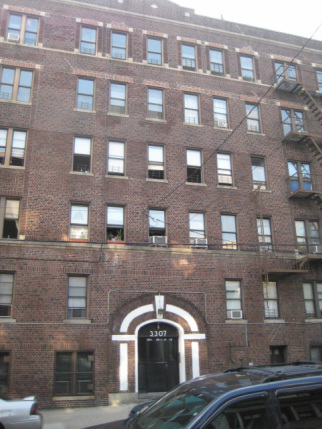
I wondered which window belonged to my family.
It's a good thing that 3307 Hull was the last stop on our tour, because at this point my kids (who do love their Gigi and Papa very much) were getting itchy. We made a beeline for Van Cortlandt Park so the kids could run around and play. (The park, about 10 blocks west of 3307 Hull, is even larger than Central Park. Though, interestingly enough, it is New York City's fourth largest park - not the biggest!) Did my mother ever play there as a kid? I'll have to find out...
This week’s Torah portion, Parshat Balak, is one of the oldest pieces of text in the biblical canon. It tells the story of the ancient Moabites, unfriendly neighbors whose territory our foremothers and forefathers had to traverse on their way home to the Land of Israel. Fearful of our ancestors, the Moabites were intent on inflicting some kind of harm.
Biblical literature is filled with numerous examples of ancient near eastern peoples who sought to hurt the Israelites by way of physical violence. In the Torah itself, the Amalekites are infamous for a sneak attack from behind that resulted in a massacre of Israelite women and children.
But here, in the heart of the Book of Numbers, the Moabites choose a different course of action. The Moabite king, Balak, hires the magician and prophet known as Balaam. Balak pays Balaam a considerable amount of money to use his renowned skill to put a verbal curse on our people. The rest of the narrative is filled with the details of Balaam’s ultimate failure to do the job that he was hired to do.
But here we should pause, and ask ourselves: why is it that Balak and the Moabites would resort to such a strange way of harming our ancestors? Why try to do it through speech and words, rather than through brute force and violence?
Rashi, our great commentator from 11th century France, imagines that Balak – before hiring Balaam – reaches out to the other near eastern peoples of the region to get the dirt on Moses and the Israelites….on who they are, and what they are about. And according to Rashi, the report that Balak receives is summarized in one sentence: ein kocho eileh b’fiv – the power that the Israelites have – literally “the only power that they have” - is centered around their words, and their speech. Rashi’s implication is clear. Balak hired Balaam to use the Israelites’ most effective weapon against themselves.
There are all sorts of theological lessons that we could derive from Balak and Balaam’s folly. But those will have to wait for a future sermon.
I’m most interested in the actual statement that Rashi makes about the Jewish condition. Again, he writes: ein kocho eileh b’fiv – their might is derived solely from their lips….from the words they use in the world.
Our Tradition has always exhibited an extraordinary awareness of the power of our words. Indeed, Rashi’s statement about Moses could just as easily be applied to the classic Jewish understanding of God: ein kocho eileh b’fiv – God’s might is derived solely through the use of words. Thus, the Torah opens with the story of the creation of the world, a feat that God accomplished simply by virtue of the power of God’s speech. As Genesis 1:3 makes plain:
Vayomer Elohim – And God said…
Yihi Or – Let there be light.
And just like that….Vayehi Or – there was light.
We learn from this that all words bear meaning, and that those meanings are equated with power. The words we speak out loud can spread love, or inflict pain – they can literally create or shatter universes – for the people who hear us.
But there are also political and historical overtones to Rashi’s statement. We read the words ein kocho eileh b’fiv and we cannot help but think about the emasculation of our people, from the time that true Jewish sovereignty in the Land of Israel ended in 586 BCE when the Babylonians destroyed the First Temple and sacked Jerusalem, until the establishment of the modern State of Israel in 1948.
For 2500 years, the Jewish people had no standing army… no real physical or political power. The force that sustained us during all of those centuries of exile around the world was our words. Words of Torah and Talmud, of midrash and commentary, words of legal literature and philosophy. Words and words and words. Inscribed in scrolls, printed in books, orally passed down, and now pixellated in blog entries and Tweets from generation to generation. Words that fill entire libraries today. Ein kocho eileh b’fiv – All we have are our words and our values. They are the essence of what it means to be a Jew. For 2500 years there were no tanks and fighter planes. No rifles or nuclear submarines. All we had to defend ourselves…all we could rely on to keep the Jewish People alive was our words.
Parshat Balak is all about blessings and curses. And so it is perhaps appropriate to observe that the creation of the State of Israel 64 years ago was both a blessing, and a curse. A blessing in the sense, of course, that the homeland we had yearned for for so long was now our’s – and is now our’s. Particularly in light of the horrors of the Holocaust, the establishment of the State, and the creation of the Israel Defense Force which came with it, was a reassuring guarantee that there would be at least one place in the world that Jews would be safe in, and safe from the kind of anti-Semitic persecution which has been an endemic reality of Jewish history and existence.
And yet, I would respectfully and humbly suggest that the tremendous power that came along with the establishment of the State and the IDF, has also been a sort of a curse. A curse in the sense that…with great power comes great responsibility.
What I mean, here, is that if Rashi was right….and that ein kocho eileh b’fiv – if the only kind of power that Jews have really ever known has been the power of our words, our speech, and our writing….then that means that the power that Jews have created and claimed for themselves through the Zionist enterprise – an enterprise that I 100% proudly subscribe to and support – then it is a kind of power that we are unfamiliar with. Never before in our history have we known what to do with weapons, and with real, brute force. We speak of Jewish ethics, and more particularly of Jewish military ethics….but if we are honest with ourselves, we must admit that such a notion is paradoxical….because in the entire history of Jewish ethics, we have never before had occasion to apply our values to the battlefield. When and where would our ancestors have had occasion to explore what that would even mean?
In that sense, the modern state of Israel – even after 64 years – remains an evolving experiment.
What are our authentic obligations – as Jews – to the Palestinians? Admittedly, that is a loaded question. I don’t have to tell you that the Israeli public, and its politicians are not of one mind on the subject, even as we witness the beginning of an unexpected coalition government under Prime Minister Netanyahu at this very moment. I won’t be so bold as to attempt to answer that question this evening. But I absolutely believe that tonight – this first night that you and I have the chance to study and pray together – is the time to begin asking that question. To put the question of our relationship with the Palestinians on the table - to raise it, and to suggest that regardless of how each of us individually answers that question – we should acknowledge that there is certainly no more pressing ethical question that we as Jews should be wrestling with at this moment in Jewish history. And so…wrestle we shall…
And even as Jewish Power has changed dramatically in Israel over the last 64 years, we have witnessed a parallel change in Jewish identity right here at home in America. These last few decades have witnessed the disintegration of most of the institutionalized anti-Semitism that at one time did mar the American Jewish experience. Quotas at universities, discrimination at country clubs, and restricted neighborhoods are all by and large a thing of the past. Anti-Semitism has not disappeared completely. And we still have not witnessed the inauguration of a Jewish president. But surely we would agree that things have changed.
We have made it in America, so to speak, and we exercise an extraordinary amount of power and influence over different segments of industry, government, and culture. We should celebrate our accomplishments. But like the State of Israel, we should be….or to say it a different way….we are Jewishly obligated to be constantly aware, and self-reflective…about the way that we use our power and authority.
This week’s Torah portion dares to challenge us: Are we using our abilities for good, and for the betterment of our community? Or to put it another way: may we re-commit ourselves to Rashi’s teaching….and his implication that there will be something fleeting about the tremendous power and authority that exists in the Jewish world today – unless that power…..our actions…the influence that we exercise….the way that we treat others…is done in such a way that it is grounded in, and shaped by, the very words and the very values of our Tradition.
Well….here we are. For the very first time, it is my great privilege to be able to say: Shabbat Shalom.
I cannot begin to express how honored and humbled I am to be standing before you this evening, and to set off on this incredible journey with you. I am excited for all that the future holds for us, and I pray that our partnership is a meaningful one that is rooted in a shared desire to deepen our commitment to Jewish learning and living, and that the end results of our work will be a reinvigorated sense of progressive Jewish identity in the 2st century, coupled with a heightened awareness of our connection and responsibility to all of those in need - here within our own Scarsdale Synagogue family, in surrounding Westchester County and the New York metropolitan area, in Israel, and around the world.
I bring greetings this evening from my wife, Amy. She and our two children, our almost six year old daughter Siona and almost two year old son Avi are home together, but they are all anxious to meet you and begin getting to know you, as I am, in the coming weeks and months.
If you’ll excuse the formality of this, I do want to make a point of thanking a number of people who have made this moment possible. To Ellen Baken and Steve Eigen, the co-chairs of the Search Committee, and the other members of the search team: all I can say is – you showed incredible wisdom and discernment in making your choice! I can only hope that I live up to the potential that you saw in my candidacy.
To Ellen Plum Rosenberg, our Past President who is travelling in Europe at this very moment, and Ellen Baken, our new President: thank you for your incredible friendship and support over these last few months as we have worked together to begin to forge a vision of how we will bring the next chapter of SSTTE’s history to life.
I want to thank the entire staff for their patience and encouragement over the last few months, and this past week. I want to particularly thank Cantor Becker, Gary, Jody, Becky, and Ivy for the many phone calls and emails in which they have kindly begun to brief me on the state of the congregation. I am so looking forward to working with all of you.
I want to thank Rabbi Gordon, who was so very menschy during these last few months, as he shared the details of his portfolio with me. I know that you join me in wishing him much luck as he and Brian begin their next chapter on Long Island.
Finally, a brief word about Rabbi Klein.
As you may know, it is exceedingly rare in the synagogue world today for a rabbi to spend more than three decades with a single congregation. The length and breadth of his tenure speaks volume about who he is as a person and as a rabbi. And it also says a great deal about who you are as a community. It is impressive…and as Rabbi Klein’s successor, it is indeed humbling. To say that I have substantial shoes to fill would be the understatement of the year. I join all of you in congratulating Rabbi Klein on his many years of service to you, and Amy and I wish him and Joanne good health and much fulfillment in all of their days ahead.
As some of you know, Rabbi Klein has decided to create a little bit of space and distance – to allow me to get situated, particularly here in the sanctuary – over the next six months. I am most appreciative of his generous and compassionate understanding of the challenges associated with being the new rabbi, and I – like you – look forward to being able to greet him and welcome him back to this sanctuary in January.
Our lives are marked by a cycle of transitions. In our family lives, our work spaces, and here in our synagogue: we are regularly faced with change.
Mourning the loss, or ending, of anything in our lives is never easy. Saying goodbye to the people, things, or institutions that we associate with our past is disorienting…and breeds anxiety because we have no idea what the future holds. That which is new is frightening.
But new beginnings are also filled with new potential and possibility.
At its essence, this is what Shabbat is all about. It’s the reason that we gather together every single week. With a certain amount of sadness, we say farewell to the week that is ending. But with hope, and optimism, we set this one day aside each week in order to renew ourselves, and prepare ourselves, for the new week, and the new chapter, which lies before us...
***
"New Beginnings" by Gertrude McClain
It's only the beginning now
...a pathway yet unknown
At times the sound of other steps
...sometimes we walk alone
The best beginnings of our lives
May sometimes end in sorrow
But even on our darkest days
The sun will shine tomorrow.
So we must do our very best
Whatever life may bring
And look beyond the winter chill
To smell the breath of spring.
Into each life will always come
A time to start anew
A new beginning for each heart
As fresh as morning dew.
Although the cares of life are great
And hands are bowed so low
The storms of life will leave behind
The wonder of a rainbow.
The years will never take away
Our chance to start anew
It's only the beginning now
So dreams can still come true.
After six months of anticipation, Day One of my tenure at SSTTE arrived this morning. It's a Sunday during the summer, so the temple calendar was quiet today...a small gift to me and my family as we continue our transition to New York.
Amy and I decided to "play tourist" with the kids, and so we wound up at South Street Seaport in the City, and soon thereafter on a boat tour around New York Harbor. Although a sail past the Statue of Liberty hadn't been a focal point of our thinking behind the adventure, I found myself incredibly moved during a day which was just supposed to be fun. Although it admittedly sounds corny, it struck me as remarkable that my family and I were experiencing the very same welcome to New York City that all eight of my great-grandparents had one hundred years earlier. And as I realized that, I began thinking about what brings each of us to New York in the first place.
Some of us move here as adults, because of professional opportunities, or because of the allure of living in THE CITY.
But many of us are here (or in my case: return here) because our families are rooted here. And, for so many of us: we are rooted here...because this is the place where our great-grandparents (or other relatives) first arrived in this country. This place....this city...is our home - because a hundred years ago, our relatives didn't have any other place to call home. Except for this country. And except for this remarkable city, which by its very nature (as expressed via the statute who is the goodwill ambassador of New York) seems to radiate a sense of welcoming to all who seek a new life here. The New Colossus
Not like the brazen giant of Greek fame,
With conquering limbs astride from land to land;
Here at our sea-washed, sunset gates shall stand
A mighty woman with a torch, whose flame
Is the imprisoned lightning, and her name
Mother of Exiles. From her beacon-hand
Glows world-wide welcome; her mild eyes command
The air-bridged harbor that twin cities frame.
"Keep, ancient lands, your storied pomp!" cries she
With silent lips. "Give me your tired, your poor,
Your huddled masses yearning to breathe free,
The wretched refuse of your teeming shore.
Send these, the homeless, tempest-tost to me,
I lift my lamp beside the golden door!"
- Emma Lazarus, 1883 Though living in New York is a privilege that perhaps some of us take for granted - as Jews I would humbly suggest that our connection to this city is something sacred...something that we must acknowledge from time to time...in order to express humility, and remembrance of the fact that our forbears came to these shores with nothing but the clothes on their backs. And we should offer up gratitude that this City welcomed them anyway.
Okay...so I won't be residing in New York City proper. But today, I am immensely proud to be able to call myself a New Yorker.
Below, please find my final sermon delivered to Temple Solel at Shabbat Morning Services on June 16, 2012.The German playwright Bertolt Brecht once wrote: “Because things are the way they are, things will not stay the way they are.”
Change is inevitable.
Agitating for change is at the heart of our Jewish identities. The very idea of tikkun olam, to repair or perfect the world that we live in, is dependent on the presumption that the world can and should be improved. Perfection, by and large, does not actually exist in the Jewish imagination. We are philosophically hard-wired into believing that the nature of the world around us can always be improved upon.
And yet, Tolstoy was on to something when he observed that “Everyone thinks of changing the world, but no one thinks of changing himself.”
That’s because change is painfully difficult. Whether we are experiencing a sense of transition or transformation in our lives that is our choice: like entering into a new marriage, or travelling across the country to start a new and exciting job….or whether the change is being foisted upon us against our will: like when we have to come to terms with the death of someone we were close to, or when a romantic partner is ready to walk away from a relationship that we are still deeply invested in…in both cases our worlds are turned upside down. That which we knew, and were comforted by, is gone.
And in its place is just new, new, new. New might be flashy and fun. But new can also be deeply terrifying, because it is so unfamiliar.
Consider, for a moment, the Hebrew words shoneh, which means anything that is different; and, sonay, which represents all that we hate. The assonance between the words suggests a semantic connection that we can all learn from: that our human nature biologically preconditions us to be suspicious of change, and of the questionable newness that springs forth from it.
Conveniently, all of this plays out in this week’s Torah portion, Parshat Shelach Lecha.
Moses tasks twelve spies with the responsibility of sneaking into the Land of Israel in order to gain information about the Land and its inhabitants.
Upon their return, ten of the twelve offer this report to Moses and the entire Israelite community: “We arrived at the Land to which you sent us, and indeed it flows with milk and honey, and this is its fruit. But, the people that dwells in the Land are powerful, the cities are greatly fortified, and we also saw there the offspring of giants.”
It matters not that Joshua and Caleb tried to counter those words with reassurances that the Israelites could conquer the land. The damage had been done. The Ten successfully incited the rest of the people. They dreaded change. And so they spontaneously revolted against Moses and Aaron.
“If only we had died in the land of Egypt, or if only we had died in this wilderness! Why is the Eternal One bringing us to this land to die by the sword? […] Is it not better for us to return to Egypt?”
Shoneh and Sonay: we hate the prospect of dealing with difference and of the new. The Israelites hated it so much that they would have rather returned to slavery in Egypt!
In preparation for my own upcoming transition, I’ve been studying the work of William Bridges. Bridges is one of our country’s leading experts on change, and on how companies, organizations, and individuals can navigate it healthily.
At the heart of Bridges’ writing, best summarized in his book Managing Transitions, he argues that there are three stages to the transformations that are a part of our lives.
He calls the first stage Endings. No smooth transition to something new can happen before we make our peace with the ending of that which is old, or familiar. He uses the language of grieving: when we leave behind something or someone familiar, it is literally akin to mourning a person’s death – even if no one actually died.
In the parsha, when the Israelites shockingly declare their desire to go back to slavery in Egypt, we can see clearly that they never adequately grieved the end of their existence there. And who can blame them? The Torah says that they were in such a rush to get out….If there wasn’t time for the dough to rise, then there certainly wasn’t time for them to reflect on hundreds of years of indentured servitude and the new prospect of freedom.
In an homage to Star Trek, Bridges calls the second stage of transitions “the Neutral Zone.” For Bridges, this is, by far, the most important part of any change-adaptation process. The Neutral Zone is the place where we are supposed to do the hard work of beginning to change….We have to change something in ourselves…in order to adapt to the new changes around us.
God seems to recognize the wisdom of giving the Israelites time in order to do the hard work of the Neutral Zone. For it is in this very parsha that God declares that there shall be forty years of wandering in the desert….and that the vast majority of Israelites who came out of Egypt will not be allowed to enter into the Land of Israel. God understands that the People will need time – to grow, and to change – in order to adapt to the new world that they find themselves in.
And finally, when all of this hard work is done….when we are ready to accept and embrace the change that awaits us, then Bridges teaches us that we are ready to celebrate our New Beginnings.
Remember: listing three steps is easy. Actually working these steps….working on them, and doing them, is incredibly hard. But, as this week’s Torah portion shows us….we as individuals – and the corporations and organizations that we associate ourselves with – have no choice. If we don’t grieve our losses….If we don’t do some serious self reflection about where we came from and where we want to go to….then we’ll never be able to move forward into our future in a healthy way. We’ll be far more likely to pay the price of getting “stuck” – like our ancestors did by their 40 year sojourn in the desert - if we don’t do the work to prepare ourselves to move on.
What do we need in order to be able to do the work of these three steps…to prepare us for being open to change?
According to the parsha, all we need is God’s help. Our rabbis believed that the reason that Joshua did not join the Ten Faithless Naysayer Spies is because Moses prayed to God on Joshua’s behalf. The implication is clear: Joshua was open to the New because God helped open his eyes to see, and helped him along the way. Almost like a Divine Transition Coach, we can imagine God teaching Joshua how to grieve his Egyptian past, do the work of the Neutral Zone, and then be open to the idea that God would of course help the Israelites conquer the Land of Israel.
Yet this solution, proposed by our parsha, presents its own set of theological difficulties.
I am not one who typically believes that God can directly, and personally, intervene miraculously in our everyday lives. The idea of God is certainly inspirational to me, and believing in a Source of Holiness lends me inner strength. But our commentaries are clear: Joshua was the beneficiary of a divine revelational miracle….the likes of which I personally do not believe happen today….which means that I am in search of a different path that might enable us to navigate the different steps of change.
For guidance, we might look to other place in the Torah where Moses prays for Joshua’s well-being. In Deuteronomy 31:7, as Moses prepares to present Joshua as his successor, he says: “Chazak ve’ematz – be strong and of good courage, for you shall come with this people to the Land that the Eternal One swore to give to them and you shall cause them to inherit it.”
Note the striking difference between the two prayers. In the first one, we are taught to passively rely on God’s miraculous intervention in our lives in order to navigate seasons of change. And in the second, we are empowered to take matters into our own hands – to “man up” as they say, to look our fear and anxiety in the eyes, with strength and with courage….and if we do so, our Tradition passionately believes, then anything is possible. If we are courageous enough to be able to encounter our present reality, and envision a different one….a better one….and if we are able to somehow master our emotions in order to do what needs to be done….not just to improve our own lives, but also perhaps to improve the world…..then anything is possible.
This is, as I’ve said, hard work to do. Some of us will find ourselves in Bridges’ Neutral Zone wanting to move forward….but….having a hard time committing. Perhaps we are waiting around for that day in the future when it will feel easier, or more right, to take the final steps on the road toward fully marking a New Beginning.
Our Tradition believes that that is a mistake. New Beginnings can, and should happen today – and everyday….and that it would be a missed opportunity if we somehow were to put off the hard work of embracing change until tomorrow, or the day after, or even the day after that.
Rabbi Nachman of Bratslav teaches us that we should: “Think only about today. Think only about the present day and the present moment. When someone wants to start serving God [or, we might say, embrace a change in their life], it seems too much of a burden to bear. But if you remember that you only have today, it won’t be such a burden. Don’t put off serving God from one day to the next, saying, ‘I’ll start tomorrow – tomorrow, I’ll [try to get to it].’ All a person has is the present day and the present moment. For tomorrow is a whole different world.’
NOTE: This, my inaugural posting here at "Seventy Faces of Torah," is also my final blog posting for Temple Solel and so you can also find this published at etanu.blog. Please take a moment to explore the new blog here and its companion website (still under construction!). I welcome your feedback about how I can improve it. ***All endings birth new beginnings. And all new beginnings start with endings.
I have lived those dual realities since my new friends at Scarsdale Synagogue (in Scarsdale, NY) invited me to become their new rabbi (as of July 1, 2012) this past fall. I am honored and overwhelmed to be taking this next step in my career and in my rabbinate. And my family and I are most excited to be returning home to the East Coast to our family and friends. And yet, there is also much sadness: because this new beginning of our's necessitates a certain 'ending' to the life we have loved and known here in San Diego.
As we prepare to wish everyone in California farewell, my family and I have been struck by a profound sense of gratitude. And so, if you will permit me in this final Solel blog posting (and first New York one!), I'd like to briefly reflect on the Jewish notion of gratitude, as I say to you all: thank you. Allow me to begin by recommending Alan Morinis' chapter on gratitude in his book Everyday Holiness: The Jewish Spiritual Path of Mussar. Morinis is a master teacher who has breathed new life into the practice of mussar over the last few years. All of us can benefit from the practical wisdom that he distills.
He opens his chapter by quoting from the Talmud (my own adapted translation): "Ben Zoma used to say: A good guest says: 'How much my host has toiled for me! He put so much meat in front of me, so much wine, so much bread - all his exertion was just for me!' A bad guest says: 'What did my host do for me? I ate just a tiny roll, a single piece of meat, and I drank just one cup of wine - all of his exertion was on behalf of his family.'"
With tears in my eyes: I look back over these last seven years, and I proclaim: "How much my host has toiled for me!" There are no words to describe how grateful I am to my fellow staff members, and the lay people I was privileged to work, partner, study, celebrate, and mourn with...for sacrificing a bit of yourselves as I learned from you what it means to be a rabbi. My new community at Scarsdale Synagogue will be the ultimate beneficiaries of your chesed. Though the gifts you have given me are far too numerous to mention individually, please know that I cherish each and every one of them - as I cherish each and every one of you.
The only thing that has amazed Amy and I more than the professional kindnesses showered on me as a rabbi has been the way that the entire Temple Solel family welcomed and extended itself to our family. How blessed we feel that Temple Solel was the place where we had the chance to begin our family. When I think of our building, I will always think of it first as the place where Siona was named in 2006, and where Avi's bris was held in 2010. It was in the midst of those rituals that Amy and I learned the essence of what Solel is all about: a place of deep love and warmth. Like you, we came to intimately appreciate the presence of Rabbi Frank, Cantor Robbins, and more recently Cantor Tiep as we marked those two holy moments in our lifecycle. What else can we say, but thank you for those memories.
Most of all, I remain humbled by the fact that the temple's Assistant Rabbi Search Committee saw a glimmer of potential in the "green" graduating rabbinical student they met in the winter of 2005. For the faith that you had in me in that season: I will forever be in your debt.
That same sense of humility is something that I am very much aware of, as I look forward to beginning my new tenure in New York...and as my family excitedly looks forward to our coming move, and the new life that awaits us there. While it is true that I know much, much more now about what it means to be a rabbi (as compared to seven years ago), I am also aware of the new responsibilities and expectations that await me in Scarsdale. And so it is that I am in Scarsdale Synagogue's debt as well, for the sacred trust you will shortly place in my hands, and for your belief that we can work together to write the next chapter of SSTTE's history. To my new friends there: I can only say how privileged and delighted I am to be able to begin to dream big dreams with you about what a vibrant 21st century progressive Jewish community can look like.
So, to friends old and new, I say: THANK YOU.
Morinis concludes piously by quoting Psalm 92: "It is good to give thanks to the Lord, And to sing praises to Your name, O Most High, To proclaim Your goodness in the morning, And Your faithfulness at night."
But equally appropriate would be the words of the The Beatles. To my Solel friends: You (We!) say goodbye....And to my Scarsdale friends: I say hello!
Welcome! My new blog is currently under construction. In the meantime, my blog postings from Temple Solel (2009-2012) are archived here.
|

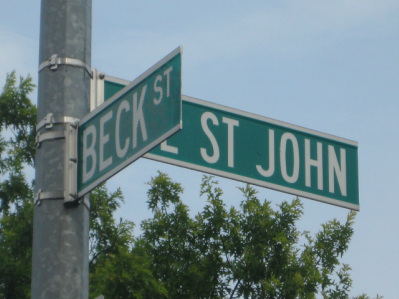












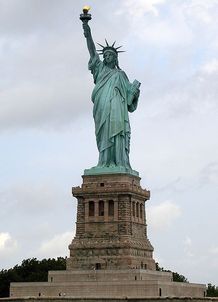
 RSS Feed
RSS Feed